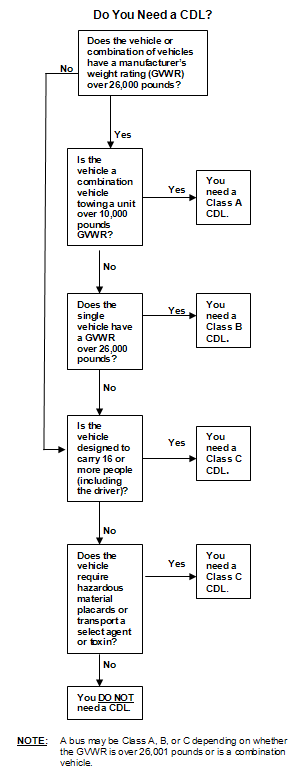Florida CDL Handbook: Introduction
1. Introduction
DHSMV Contact Information
Contact Information
| Customer Service Center | (850) 617-2000 |
| DHSMV Official Web Site | www.flhsmv.gov |
| Gather Go Get Find out what you need to bring with you before you make the trip. | What To Bring (850) 617-3995 |
| DHSMV Virtual Office (online transactions) | GoRenew.com |
Appointments
Appointments are recommended for any of the services provided by the driver license offices. Appointment scheduling and a listing of driver license offices are available on our homepage at www.flhsmv.gov. Schedule your appointment in advance and report at least five minutes before your scheduled time.
Emergency Contact Information
In an emergency situation could law enforcement personnel contact someone for you?
They could if you had entered your information onto the emergency contact information system. The system allows Floridians to voluntarily provide emergency contact information online, giving law enforcement immediate access to this information and making it easier for them to speak with someone quicker in case of emergency.
If you have a Florida driver license or identification card, you can go online at http://www.flhsmv.gov and enter your emergency contact information. This information is available to law enforcement officers through a secure, web-based system and, by law, can only be used in the event of an emergency.
Frequently Asked Questions
Why was this system developed?
Christine Olson's daughter Tiffany was fatally injured in a traffic accident in 2005. There was no emergency contact system in place and several hours passed before Ms. Olson was notified of her daughter's passing. Wanting to help others avoid this experience, Ms. Olson approached her Legislator, Representative Bill Galvano, and the Department of Highway Safety and Motor Vehicles. The result is an emergency contact information system.
Who will have access to my information?
Only law enforcement personnel will have access to your emergency contact information.
Where is this information stored?
The information is stored in the Driver and Vehicle Information Database (D.A.V.I.D) system which is a secured database used by most law enforcement agencies in the state of Florida.
Will my contact information be used for any other purpose?
No, this information will only be used by law enforcement officers to notify designated contacts if a motorist is seriously injured or killed in a traffic crash.
Where do I enter my information?
You can go online and enter your information at http://www.flhsmv.gov or whenever conducting any business at a driver license office. There are also links to this site if you are conducting business with the Department of Highway Safety and Motor Vehicles online such as renewing your driver license, changing the address on your license or renewing your vehicle license plate.
Florida's Move Over Law
- Protects law enforcement officers, emergency workers, and tow truck drivers stopped along roadways while performing their jobs;
- Requires motorists to move over when a patrol car, emergency vehicle, or tow truck/wrecker is stopped on the side of the road with lights flashing. If such movement cannot be safely accomplished, motorists shall slow down to a speed of 20 mph below the posted speed limit.
Motorists are required to:
- Approach the emergency vehicle with caution;
- Change lanes away from the emergency veicle IF traveling on a multi-lane roadway AND able to move over safely; or
- Slow down while maintaining a safe speed of 20 mph below posted speed limit being careful NOT to Impede or block the flow of traffic unless otherwise directed by law enforcement officer.
Violators of the Move Over Law will be issued a citation!
For more information, please visitwww.flhsmv.gov/fhp
Specific provisions of the Move Over Law can be reviewed under Section 316.126(1)(b), Florida Statutes. Available online at www.leg.state.fl.us
This Section Covers
- Commercial Driver License Tests
- Driver Disqualifications
- Other Safety Rules
There is a federal requirement that each state have minimum standards for the licensing of commercial drivers.
This manual provides driver license testing information for drivers who wish to have a commercial driver license (CDL). This manual does NOT provide information on all the federal and state requirements needed before you can drive a commercial motor vehicle (CMV). Information for CMV operation requirements may be obtained from the Florida Department of Transportation, Office of Motor Carrier Compliance, or the Federal Motor Carrier Safety Administration.
You must have a CDL to operate:
- Any single vehicle with a gross vehicle weight rating (GVWR) of 26,001 pounds or more.
- A trailer with a GVWR of more than 10,000 pounds if the gross combination weight rating (GCWR) is 26,001 pounds or more.
- A vehicle designed to transport 16 or more passengers (including the driver).
- Any size vehicle that is used in the transportation of any material that requires hazardous materials placards or any quantity of a material listed as a select agent or toxin in 42 CFR 73.
To get a CDL, you must pass knowledge and skills tests. This manual will help you pass the tests. This manual is not a substitute for a truck driver training class or program. Formal training is the most reliable way to learn the many special skills required for safely driving a large commercial vehicle and becoming a professional driver in the trucking industry.
Figure 1.1 helps you determine if you need a CDL.

Figure 1-1
Check out our Customer Reviews!


